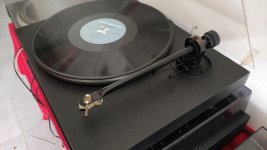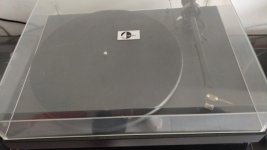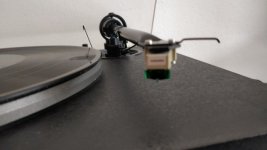Excellent reading!
Thanks for sharing!
Very, very interesting indeed. Even though I'm a CD man today, I don't know if I'll ever go back to origins, to vinyl. I find it difficult because, from what I am reading, many vinyl recordings today are not worth the effort (and the Money! :weird

, while, from what I am seeing, some current CD productions are truly phenomenal, which results in a high quality listening and full satisfaction.
So what would take me back to vinyl? Probably the memory of a certain sound that stayed in my head from the days when i had a turntable. The transposition to CD of some of these vinyl albums from the 80´s and 90´s didn't even come close in quality sound.
We all have many examples, I will stick to just one. One of my favorite classical works, of which I currently have 3 versions (I already had more due the search for the best recording, not so much from the interpretation), is Beethoven's violin concerto. In the superb interpretation of Stern Bernstein, together with the New York Philharmonic, on vinyl, I recall the most natural and wonderful violin sound I have ever been able to experience in home music reproduction. I am sure that whoever knows something about violin brands, listening through the vinyl, certainly identifies the violin brand. Something that we do not have from far or near in the CD copy. But we can argue that the supremacy of vinyl stems from the original recording being analog, Ok, I will then go further and say that I have not yet heard a similar violin in any of the best and current digital recordings. Not even close! Let´s say that there is something unparalleled between an excellent (old) analog recording and an excellent (modern) digital one.
So why don't I even have a turntable? In conversations with audiophile friends I usually say that audio is a maze. Vinyl may be even more so! Turntables, arms, cartridges, fine tuning… Add to this the fact that audiophile quality is also not the rule in many records edited in the golden years of vinyl and today´s quality it is defrauded by copies of digital recordings. Let's say that in the golden years of vinyl, the audiophile concern was not so present in most productions, being today hampered by the predominance of digital recordings.
Returning to the article, I don't know if it explains everything, because the audiophile issue is not just vinyl vs. digital.
Could the science mistake be found in so many wars that we all know very well, like MC vs MM; multi bit vs bitstream; valves vs Transistors, copper vs silver; sealed vs ported; etc etc? Everything is conflict in the audio, everything is discussed in opposite fields. But perhaps the part I want to highlight and incorporate in the context of the article, since it refers to and supports the brain's unsuspected ability to deal with and recognize minimal variations in sound properties, to reinforce the idea of the danger of apologizing for certain so-called scientific truths that so many audiophiles continually defend, and that due to the rationality of the arguments they are trying to impose. We know so little about the capabilities of our brain, and, in the same way, the knowledge of physics is not yet sufficient to explain and solve all the phenomena that result from the vibration of the air at different frequencies that results in the phenomenon that we classify as sound. For this reason, I, who have always noticed differences in sound in relation to everything (or almost everything :audiophile

, sometimes feel insulted (to use the language of the text) when so many say that I cannot hear what i hear, just because science says so. How? If i were the only one to hear strange things i would be silent. But when so many around the world testify to hearing diferences (in cables for example), the true science does not disdain, but investigates. Trying to explain by the psychoacoustic phenomenon and placebo effect is not explaining anything. Because it is not science. It's just speech.
So, can science be wrong not only in the discussion vinil vs Cd but in so many themes in the audio?



